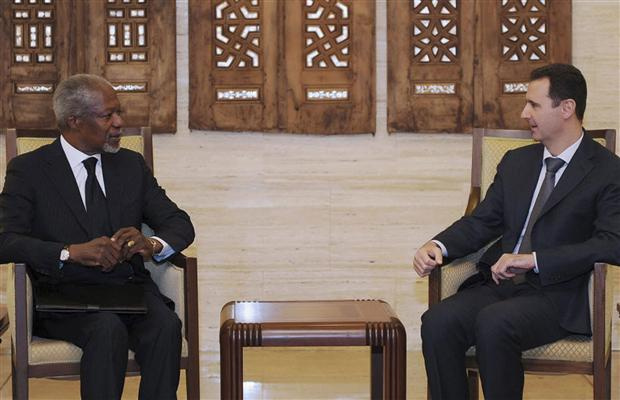Annan and Assad: Negotiations West wishes to fail
Whatever the outcome of former UN Secretary General’s visit to Damascus, the anti-Assad alliance will not relent in its campaign to overthrow him. Interview with Mahdi Motahhari.

IRD: Kofi Annan is experiencing perhaps one of his toughest diplomatic missions ever; even more challenging than those he handled in his capacity as the UN Secretary General. The Ghanaian diplomat is now engaged in talks with Syrian President Bashar Assad to find an effective solution to put an end to one of the most violent revolts in the Middle East in the wake of the Arab Spring. Could Annan’s visit lead to any productive development in Syrian affairs? Iranian Diplomacy has discussed the question with Mahdi Motahharnia, Middle East affairs analyst:
IRD: Do you think Kofi Annan’s visit to Syria could improve the situation?
MM: I doubt that. The crisis seems to be at a point of no return, and there is little that Annan’s visit could do to help improve the situation. I think his visit might even aggravate the situation. Given the determination of both sides of the conflict to root out its rival, Annan’s visit will be appropriated by each in their media and the psychological warfare to portray themselves as the victimized party. At this stage, Assad is trying to exploit the gap created among the opposition, while his enemies are pushing foreign powers for military intervention.
IRD: Lavrov called for Syria’s immediate support for Annan’s peace plans. Do you think Moscow is moderating its stance towards the Syrian crisis?
MM: Post-Communist Russia follows two parallel policies at the same time: it tries to maintain face as the heir to the Soviet superpower, but it also never neglects to bargain where bargains are due, especially when they involve economic benefits. The Russians are aware of their weakness in confronting the West in their periphery. They’re caught between a hammer and an anvil: Syria may not be the last pro-Moscow country of the region that the West will bring under its own influence. So what they are actually doing about Syria is using their superpower garb to retain a minimum level of strategic foothold in Syria, and in the meantime, receive concessions from the Western powers. Syria cannot rely on Moscow’s support.
IRD: It seems that all the parties engaged in the Syrian crisis, from China, Russia and Iran to the Arab League and the Western powers, are on alert and waiting for the outcome of Annan’s talks with Bashar Assad. The pressure on Syria seems to have eased in recent days. How long can these circumstances continue?
MM: I think the next step by the anti-Assad alliance is stepping up media pressure to persuade public opinion about the legitimacy of a military attack. The relative silence is just a tactical measure. Sooner or later, they will announce that there are no chances for Assad to change and will call for his resignation.
IRD: Do you think Kofi Annan’s visit to Syria could improve the situation?
MM: I doubt that. The crisis seems to be at a point of no return, and there is little that Annan’s visit could do to help improve the situation. I think his visit might even aggravate the situation. Given the determination of both sides of the conflict to root out its rival, Annan’s visit will be appropriated by each in their media and the psychological warfare to portray themselves as the victimized party. At this stage, Assad is trying to exploit the gap created among the opposition, while his enemies are pushing foreign powers for military intervention.
IRD: Lavrov called for Syria’s immediate support for Annan’s peace plans. Do you think Moscow is moderating its stance towards the Syrian crisis?
MM: Post-Communist Russia follows two parallel policies at the same time: it tries to maintain face as the heir to the Soviet superpower, but it also never neglects to bargain where bargains are due, especially when they involve economic benefits. The Russians are aware of their weakness in confronting the West in their periphery. They’re caught between a hammer and an anvil: Syria may not be the last pro-Moscow country of the region that the West will bring under its own influence. So what they are actually doing about Syria is using their superpower garb to retain a minimum level of strategic foothold in Syria, and in the meantime, receive concessions from the Western powers. Syria cannot rely on Moscow’s support.
IRD: It seems that all the parties engaged in the Syrian crisis, from China, Russia and Iran to the Arab League and the Western powers, are on alert and waiting for the outcome of Annan’s talks with Bashar Assad. The pressure on Syria seems to have eased in recent days. How long can these circumstances continue?
MM: I think the next step by the anti-Assad alliance is stepping up media pressure to persuade public opinion about the legitimacy of a military attack. The relative silence is just a tactical measure. Sooner or later, they will announce that there are no chances for Assad to change and will call for his resignation.

